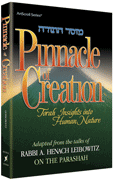
No matter how far or how low we have fallen, He is always waiting for us
“And the Divine spoke to Moses in the desert of Sinai . . . ”
— Numbers 1:1
The Midrash (Bamidbar Rabbah 1:2) tells us that the Jews in the time of the prophet Jeremiah had sinned greatly. The people felt that they had created such a wide chasm between themselves and the Divine that it was impossible for them ever to ever repent. Jeremiah prophetically gave the Divine's answer: "Have I been a desert to the Jewish Nation? A land of darkness? Why do My people say, 'We have been separated from You, we will come no more to You'?" (Jeremiah 2:31).
The Midrash explains the Divine's response. He was telling the Jewish people that they are still beloved. By using the example of a desert, the Divine was reminding them that when they had been a fledgling people in the Wilderness of Sinai they could not even tell that they were actually in a forbidding desert.
The Divine provided them with manna to eat; the Clouds of Glory shaded them, killed the snakes and scorpions, and smoothed out the path before them by flattening the mountains and raising up the valleys. The Divine was in essence telling Jeremiah's generation, "I have shown you how much I love you — you are close to Me and repenting is certainly possible."
The miracles the Divine performed for Jewry in the desert were outstanding indicators of the Divine's love for the generation He saved from slavery in Egypt. How, though, did those wonders prove that the Divine's love and closeness would still exist so many years and a myriad of sins later?
The Jews of Jeremiah's time knew quite well the story of the Exodus from Egypt, yet they felt that their generation was far less worthy than the generation that stood at Sinai. Jeremiah's contemporaries despaired that the closeness The Divine once felt for them had disappeared due to their sins. How did The Divine's statement convince them that His love would still allow them to return to Him?
The people of Jeremiah's generation originally felt that the Divine's love for the Jewish people was dependent upon our national level of religiosity and righteousness.
They metaphorically looked in their mirror, saw their low spiritual state of affairs, and became despondent.
When the Divine reminded them of His kindness to our forefathers in the desert, He was showing them that His abundant kindness far surpassed even that which these great people deserved. The message is that the Divine's love for the Jewish people is unconditional — like that of a father to a son. His love for us never wanes and is not dependent on our spiritual level. Just as a father loves his child under any circumstances, so too, the Divine loves us beyond what we deserve, even when we are mired in the depths of sin.
As the Chovos HaLevavos states in Shaar HaBitachon (Chap. 3, First Principle): "The sixth [condition to have trust in the Divine] is that one should be aware of the Divine's overwhelming goodness to him, and that due to His great kindness and beneficence, the Divine bestowed good upon him from the very beginning, not because the person deserved it, and not because the Divine had any need to do so, but rather out of generosity, goodness and kindness …."
Often we find ourselves in a time of difficulty, perhaps faced with an illness, the loss of a job, or any type of suffering. A caring friend reminds us to trust in the Divine, to have bitachon (faith) that the Divine will save us in any circumstance. When we try to focus on that message of hope, our vision often becomes blurred by feelings of despair.
"What if I don't deserve the Divine's kindness? I have committed so many sins, why would He want to save me?"
At these times of hopelessness we must remind ourselves of the Divine's unconditional love. It would be very shortsighted and even naïve to believe that the kindness the Divine has shown us throughout our lives extends only to what we deserve and not well beyond.
| INSPIRED BY THIS ARTICLE? BUY THE BOOK ... | |
 at a discount by clicking HERE . at a discount by clicking HERE . | |
At the same time we can apply Jeremiah's pasuk, and his message, to ourselves. We shouldn't let our past mistakes discourage us from attempting to change and improve ourselves. We are never separated from the Divine. No matter how far or how low we have fallen, He is always waiting for us, like a patient, loving father, to turn back to Him in sincere teshuvah. If we internalize this message of the Divine's eternal, unconditional love, we will feel, in turn, feelings of love towards the Divine, which will provide a powerful motivation to begin the first steps of genuine repentance.
Every weekday JewishWorldReview.com publishes inspiring articles. Sign up for our daily update. It's free. Just click here.
One of America's senior Torah sages, Rabbi A. Henach Leibowitz was dean of the Rabbinical Seminary of America, in Queens, New York for more than 50 years. The institution has branches and affiliates all across North America and Israel. This article was prepared by two of the sage's disciples, Rabbi Aryeh Striks and Rabbi Shimon Zehnwirth, and excerpted fro, "Pinnacle of Creation: Torah insights into human nature".


 Contact The Editor
Contact The Editor
 Articles By This Author
Articles By This Author